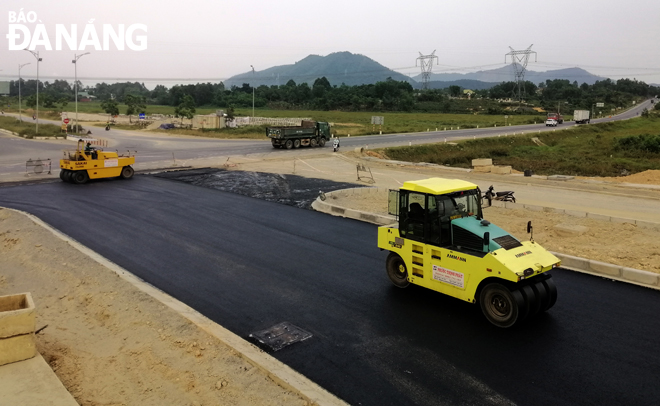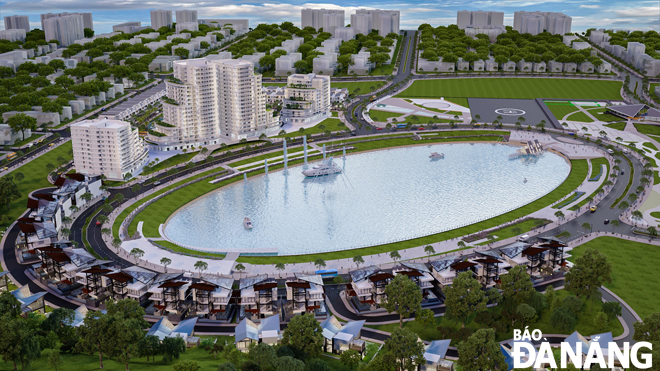Strong opportunities for growth in industrial property sector after coronavirus crisis ends
Coronavirus is hitting many industries and businessses operating in Da Nang. However, many foreign -owned companies in the city are experiencing high demand for high-quality warehouses, ready-built factories, and built-to-suit facilities in the Da Nang Hi-Tech Park to maintain their production activities.
 |
| DITP developing infrastructure on the 1st stage of the Dedicated Information Technology Park project |
Many projects to develop infrastructure for industrial parks are underway, and industrial estates are being created in the city. There are strong opportunities for growth in industrial property sector after coronavirus crisis ends.
The Long Hau JSC, the developer of a number of industrial parks in southern Viet Nam, has poured more than one trillion VND into the construction of the hi-tech factory cluster for lease in the Da Nang Hi-tech Park.
Once completed, the cluster, covering a total of over 29.6 ha of land, will provide ready-built factories, with an area of 500 - 3,300m2 each, for investors, plus 170m2 offices for rent.
The Da Nang Information Technology Park (DITP) Development JSC has spent dozens of thousands of billion VND on developing infrastructure on the 1st stage of the Dedicated Information Technology Park project in Hoa Vang District’s Hoa Lien Commune.
Mr Lam Quang Binh, a local investment consultant, said the city’s industrial property sector is not so much affected by the coronavirus crisis, and many domestic and foreign investors have not hesitated to pour money into infrastructure development projects in the city.
He explained the reason that Da Nang has become safe and attractive destination for investors at both home and abroad thanks to the municipal government’s efforts and success in containing the spread of coronavirus.
Mr Binh also remarked that most of foreign firms operating in the city prefered to rent ready-built factories and premises in industrial parks that have completed infrastructure systems.
Built-to-suit facilities are always designed and built flexibly by investors to satisfy requirements of tenants and meet standards of each manufacturing industry.
Based on these facts, that is no denying that ready-built factories help businesses save costs and quickly go into production, and facilitate the industrial property sector to thrive as well.
In particular, the first stage of the hi-tech factory cluster located in the Da Nang Hi-tech Park has recently leased to two Japanese-invested high-tech equipment manufacturing projects, namely US$5.13 million Hatsuta and US$6 million Inaba.
 |
| Strong growth of industrial property sector will also help boost the urban development in northwestern side of the city |
According to companies specialising in conducting research into domestic and international real estate markets, Da Nang has great potential for the development of the industrial sector, especially the industrial real estate segment.
The main reason is thought that the city boasts its favourable geographical position of being a key gateway for the East-West Economic Corridor (EWEC). Also, the city’s soon-to-be-developed projects of Lien Chieu Port, and the international passenger terminal T3 at Da Nang International Airport, will create more motivation for the development of the industrial sector.
Assessing the city’s potential for the development of industrial property sector, General Director of the VietGroup Company Truong Dinh Duc said the sector will thrive late this year and over next years.
He explained the reason that Viet Nam has been joining many new-generation free trade agreements (FTAs), including the EU-Vietnam trade agreement eliminating over 99% of all tariffs. This will help Viet Nam diversify its economic and trade relations, especially expanding its import and export markets, avoiding excessive dependence on a specific region, and helping the economy cope better with external fluctuations.
This also means that industrial parks and clusters in Viet Nam will become more attractive to foreign investors who want to shift their production from other countries to Viet Nam, hence increasing the demand for industrial properties around the country, including Da Nang.
Mr Nguyen Tam Thinh, Chairman of the Board of Directors of DITP, suggested that the city should focus on improving its infrastructure systems in order to attract more foreign investment flows into the industrial property sector.
Importance should be attached to accelerating the construction of the expanded Hoa Cam, Hoa Nhon and Hoa Ninh industrial parks, along with new industrial clusters in the city, in a bid to solve premises-related problems faced by businesses operating in the city soon.
By TRIEU TUNG - Translated by MAI DUNG